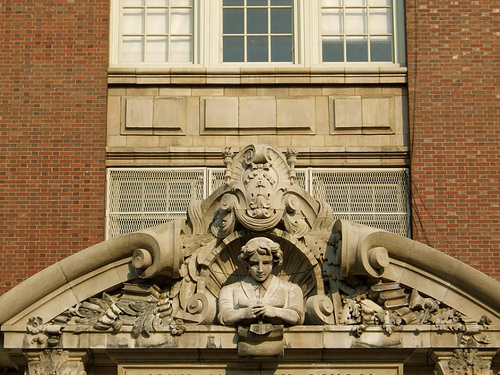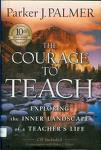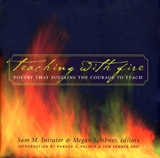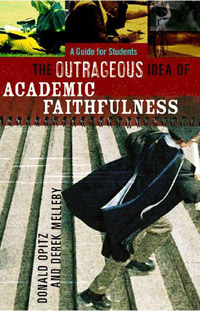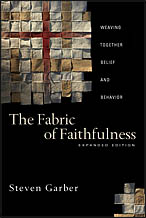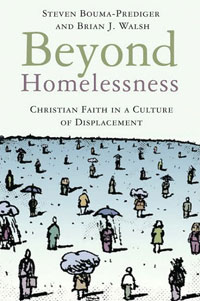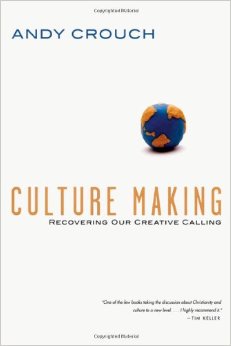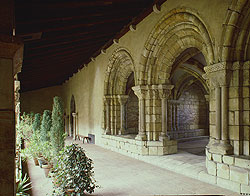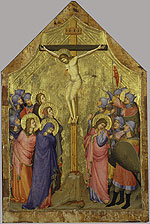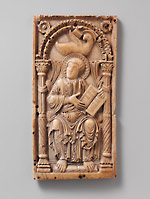Regardless of your political persuasions, I hope you watched some of the Democratic convention, and will also watch the upcoming speeches at the Republican convention. I am not quite a political junkie, although we do have as many books about faith and politics, I’d bet, than any store in the country. “Something to offend everyone” really is a slogan here, and, if heard with an open-minded ear, means that we have a real variety of books, something to challenge us all. We always encourage reading widely, but that may be a civic duty these days. I have written a length review piece at the monthly column a few months back suggesting books on this topic, and our Books By Vocation part of the website offers an annotated listing for political science types. There are wonderful books for those of us seeking to be Biblically faithful, agents of the sorts of change God might desire, and eager to approach our civic life with Christian sensibilities even as though that transcends typical party affiliations.
 For those who may be interested, which should be many of us, there is a fair and informative discussion of the role (and what kind of) faith plays in Mr. Obama in a newly released book. The Faith of Barack Obama is written by best selling historian and conservative author Stephen Mansfield (Nelson; $19.99.) Mr. Mansfield wrote The Faith of George W. Bush and has penned works on Winston Churchill, Booker T. Washington, and a book called The Faith of the American Soldier. He can hardly be considered a partisan, yet it seems that this book is fair-minded, thorough, and quite helpful. Archbishop Desmond Tutu has called it “perceptive and well written” as it explores Obama’s “faith-based liberal politics.” From Trinity UCC, black liberation theology, to his relationship with Sojourners magazine and Saddleback’s Rick Warren, this interesting study shows Obama’s influences and helps explain what he has said he believes.
For those who may be interested, which should be many of us, there is a fair and informative discussion of the role (and what kind of) faith plays in Mr. Obama in a newly released book. The Faith of Barack Obama is written by best selling historian and conservative author Stephen Mansfield (Nelson; $19.99.) Mr. Mansfield wrote The Faith of George W. Bush and has penned works on Winston Churchill, Booker T. Washington, and a book called The Faith of the American Soldier. He can hardly be considered a partisan, yet it seems that this book is fair-minded, thorough, and quite helpful. Archbishop Desmond Tutu has called it “perceptive and well written” as it explores Obama’s “faith-based liberal politics.” From Trinity UCC, black liberation theology, to his relationship with Sojourners magazine and Saddleback’s Rick Warren, this interesting study shows Obama’s influences and helps explain what he has said he believes.
Here is an audio interview with Mr. Mansfield about the book, his hopes to be fair (Mansfield himself is conservative and pro-life) and how this book came about.
It is exciting to many of us that Obama has motivated many younger citizens to be involved in civic affairs, and his rhetoric has inspired many as has his memoir, The Audacity of Hope. Hope is a theme, of course, of his candidacy, and regardless of the necessary evaluations we must make of the content of his positions, the vision has stirred many. It has placed change and hope in the center of the national debate.
We have several good books on hope in our store, but the one that I have been touting is–I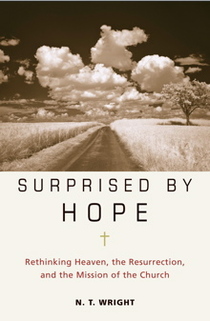 know some of our customers can predict it, since I’ve mentioned it before—the extraordinary Surprised By Hope by our favorite Bible scholar, N.T. Wright. (HarperOne; $24.95.) The subtitle is Rethinking Heaven, the Resurrection, and the Mission of the Church and from it you can see that he is asking the largest questions we can ask, questions that have been central in our ministry here: in what way does Christ’s resurrection give us hope? What is the nature of our hope–is it that our “souls” go to “heaven” for eternity? What is the destiny of history, that God will burn up the world and whisking some to an ethereal location in the clouds? No! Jesus is bringing His regime change to the planet, and his wholistic rescue mission–with the principle battle being won at Golgatha and His Kingdom vindicated through resurrection and ascension—allows us to wait and work with all creation even as we groan for redemption (see Romans 8.) What real hope—the redemption of our bodies, the restoration of creation— this brings into real history! What joy it is to read N.T. Wright’s reflections on this reality that God rules, that Christ is Victor, that His bodily resurrection is historically true, and God’s Kingdom is breaking in “on Earth as it is in Heaven.” That our hope is not pie in the sky, as they say, and that God’s ultimate intention for His planet is a restored creation regained, a new urban garden called the New Jerusalem which comes as gift as Christ returns, gives us huge and significant freedom to be new kinds of people. He explores these implications in the third portion of the book. (Amongst other things, we can be friendly critics to any and all ideologies and political movements, knowing the likelihood of idolatry and the reality of their limitations.) We care for our place, our country, even as we are loyal to another regime—God’s Kingdom. We are citizens of heaven, which means, though, as Wright shows, that we can be truly responsible actors in history.
know some of our customers can predict it, since I’ve mentioned it before—the extraordinary Surprised By Hope by our favorite Bible scholar, N.T. Wright. (HarperOne; $24.95.) The subtitle is Rethinking Heaven, the Resurrection, and the Mission of the Church and from it you can see that he is asking the largest questions we can ask, questions that have been central in our ministry here: in what way does Christ’s resurrection give us hope? What is the nature of our hope–is it that our “souls” go to “heaven” for eternity? What is the destiny of history, that God will burn up the world and whisking some to an ethereal location in the clouds? No! Jesus is bringing His regime change to the planet, and his wholistic rescue mission–with the principle battle being won at Golgatha and His Kingdom vindicated through resurrection and ascension—allows us to wait and work with all creation even as we groan for redemption (see Romans 8.) What real hope—the redemption of our bodies, the restoration of creation— this brings into real history! What joy it is to read N.T. Wright’s reflections on this reality that God rules, that Christ is Victor, that His bodily resurrection is historically true, and God’s Kingdom is breaking in “on Earth as it is in Heaven.” That our hope is not pie in the sky, as they say, and that God’s ultimate intention for His planet is a restored creation regained, a new urban garden called the New Jerusalem which comes as gift as Christ returns, gives us huge and significant freedom to be new kinds of people. He explores these implications in the third portion of the book. (Amongst other things, we can be friendly critics to any and all ideologies and political movements, knowing the likelihood of idolatry and the reality of their limitations.) We care for our place, our country, even as we are loyal to another regime—God’s Kingdom. We are citizens of heaven, which means, though, as Wright shows, that we can be truly responsible actors in history.
From a helpful explanation of our wrong-headed and sentimental views of heaven to our un-biblical views of our souls, from the shifting understanding of death and funeral practices, to dumb hymns and otherworldly piety, Wright brings great sanity to the church. He does battle with unhelpful speculations (from the theological left and right) and is in constant interaction with the most popular theological tendencies across the denominational spectrum. Surprised By Hope offers a true alternative which is a vision that is at once historically orthodox and 21st century fresh, utterly evangelical and yet quite ecumenical. With endorsements from leaders as diverse as Rob Bell and Richard Foster, Dallas Willard and Walter Brueggemann, this is widely being described as one of the most important books of our time.
Will Willimon properly calls it a “masterful work of Christian hope” where the Biblical teaching on hope is “defended, explicated, and proclaimed with wit, wisdom, intellect, and grace.” “This is,” he continues, “quite simply the best book we have on the substance of Christian hope.”
Surprise by Hope will help us get beyond (as Rob Bell puts it) “the tired old theologies of escapism and evacuation” and allows us to understand and grieve death and dysfunction, to understand not only a Christina way to live in the world but to hope well. In a political season when that word is often used, it would do us all well to plumb its deepest Biblical meaning, and there is no better resource to use. We eagerly and enthusiastically share our hope in God’s work in our world, seen, for instance, in the publication of such rich and solid works as N.T. Wright’s magnificent Surprised By Hope.
Lastly, you may be rolling your eyes at Obama, or peeved at the hilarious send-up David Brooks did in his New York Times column to the overblown Democratic speechifying (“in front of Greek columns conscientiously recycled from “Yanni—Live at the Acropolis.”) Either way, I wonder if some of us need to examine our reluctance to allow ourselves to hope. Are we too bitten by a bug called cynicism? Are we overly suspicious of everybody’s views?
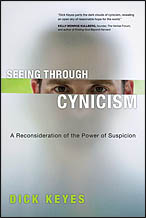 Seeing Through Cynicism: A Reconsideration of the Power of Suspicion by Dick Keyes (IVP; $16) is a book which deserves its own lengthy review, as it is wonderfully unlike any book in print. Written by the co-director of the New England L’Abri, it brings together insightful cultural criticism, thoughtful psychological study, a critique of an unqualified shift to the postmodern, and how all of this allows many of us to wallow in our nearly self-righteous contempt for nearly everything. We are so suspicious that we deconstruct nearly anything other than the weird, and carry ourselves with disengaged detached irony (even as it may parade as prophetic or hip.) Dick Keyes understands this, and has struggled honestly to examine the deepest causes of our cynical selves.
Seeing Through Cynicism: A Reconsideration of the Power of Suspicion by Dick Keyes (IVP; $16) is a book which deserves its own lengthy review, as it is wonderfully unlike any book in print. Written by the co-director of the New England L’Abri, it brings together insightful cultural criticism, thoughtful psychological study, a critique of an unqualified shift to the postmodern, and how all of this allows many of us to wallow in our nearly self-righteous contempt for nearly everything. We are so suspicious that we deconstruct nearly anything other than the weird, and carry ourselves with disengaged detached irony (even as it may parade as prophetic or hip.) Dick Keyes understands this, and has struggled honestly to examine the deepest causes of our cynical selves.
This is a book, I say again, that is truly thoughtful and exceedingly rich. It is very important, and utterly compelling for those willing to work through it. It is not a cheery little read— and it certainly is not a book about which we can be cynical. The author is brilliant and in many ways offers us new insights again and again, some based on his honest journey. Seeing Through Cynicism is a tremendous bit of Christian scholarship, and a wise spiritual anecdote to the spirit of the times. We commend it to you sincerely, with great hope. Especially for those who roll their eyes at my unabashed earnestness it thinking it could make a difference. Please know of this important resource, and pass this on to others if you think, in kindness, that it might help.
20% off
any book mentioned in this review
just ask for the blog special
ORDER
HERE
Hearts & Minds 234 East Main Street Dallastown, PA 17313 717.246.3333

